
Using Dashboards and KPIs to Monitor Project Health in SAP Business One
Why Project Monitoring Matters
Project monitoring is more than just tracking deadlines. It includes evaluating:- Budget adherence
- Resource allocation
- Task completion
- Risk factors
- Timeline health
- Milestone achievements
- Profitability
- Real-Time Updates: Data is automatically refreshed to reflect the latest project status.
- Drill-Down Capabilities: Click into specific charts or KPIs to view the underlying transactions or documents.
- Role-Based Views: Different team members (e.g., project managers, CFOs, team leads) can view dashboards relevant to their role.
- Interactive Visuals: Charts, graphs, and gauges show progress, trends, and anomalies at a glance.
- Custom KPIs: You can define your own performance indicators based on your business model.
- Project budget vs actual spend
- Time spent vs estimated time
- Task completion rate
- Profit margin per project
- Resource utilisation rate
- Billable vs non-billable hours
- Milestone adherence
- Create customised dashboards
- Design new KPIs using queries
- Add filters and thresholds
- Assign dashboards to user roles
- Budget vs actual material costs
- Progress per phase (foundation, framework, finishing)
- Workforce hours logged
- Supplier delays
- Weather-related timeline shifts
- “Budget Variance” (green/yellow/red indicators)
- “Tasks Completed %” per project phase
- “Labour Utilisation” for each site
- “Estimated vs Actual Days” on Gantt-based visuals
- Can I create custom KPIs in SAP Business One Berlin?
- Is real-time monitoring possible in SAP B1 dashboards?
- How secure is the dashboard access?
- Can I export KPI reports for meetings?
- Does SAP Business One Berlin support mobile dashboard access?




 Applicable for Package
Applicable for Package Optional
Optional